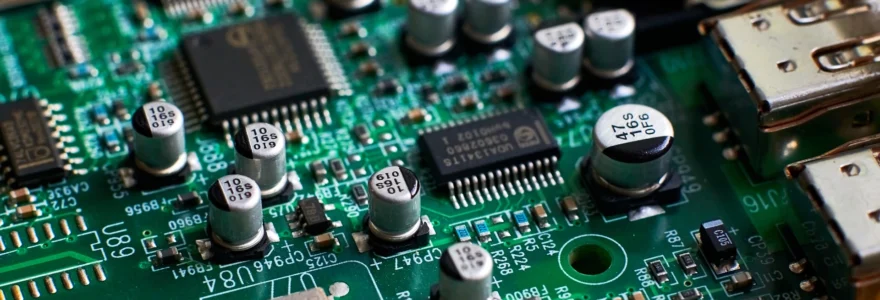In the rapidly evolving world of embedded systems, choosing the right System-on-Module (SOM) can make all the difference in your project's success. The Zeus SOM stands out as a powerful and versatile solution, offering a unique combination of security, flexibility, and performance. This cutting-edge module is designed to meet the demanding requirements of modern embedded applications, from industrial automation to advanced defense systems.
As embedded systems become increasingly complex and interconnected, the need for robust, efficient, and secure solutions has never been greater. The Zeus SOM addresses these challenges head-on, providing developers with a comprehensive platform that accelerates development cycles, enhances security, and delivers exceptional performance. Let's explore why the Zeus SOM is becoming the go-to choice for innovative embedded projects across various industries.
Zeus SOM enhances security for embedded systems
In today's interconnected world, security is paramount for embedded systems. The Zeus SOM takes this concern seriously, offering a suite of advanced security features that protect your devices from a wide range of threats. By integrating robust security measures at the hardware level, the Zeus SOM provides a solid foundation for building trustworthy and resilient embedded systems.
Robust built-in security features
The Zeus SOM incorporates state-of-the-art security technologies directly into its architecture. This includes secure boot mechanisms, hardware-based encryption engines, and tamper-resistant storage for sensitive data. These built-in features ensure that your embedded system remains protected from the moment it powers on, safeguarding against unauthorized access and malicious code execution.
One of the standout security features of the Zeus SOM is its implementation of a hardware root of trust. This provides a secure foundation for establishing a chain of trust throughout the system, verifying the integrity of software components and protecting against sophisticated attacks that target the boot process.
Protection against cyber threats
With the increasing prevalence of cyber attacks targeting embedded systems, the Zeus SOM offers comprehensive protection against a wide range of threats. Its advanced security architecture includes features such as secure key storage, cryptographic accelerators, and hardware-based firewalls. These elements work together to create a robust defense against malware, side-channel attacks, and other cyber threats that could compromise your embedded system's integrity.
The Zeus SOM's security capabilities extend beyond just prevention. It also includes advanced monitoring and logging features that allow for real-time threat detection and post-incident analysis. This proactive approach to security helps developers stay one step ahead of potential vulnerabilities and respond quickly to emerging threats.
Compliance with industry standards
In many industries, compliance with specific security standards is not just beneficial—it's mandatory. The Zeus SOM is designed with these requirements in mind, offering features that align with stringent industry standards such as FIPS 140-2, Common Criteria, and DO-254. This built-in compliance saves developers significant time and effort in the certification process, making it easier to bring products to market in regulated industries.
Moreover, the Zeus SOM's security features are regularly updated to keep pace with evolving standards and best practices. This ensures that your embedded systems remain compliant and secure throughout their lifecycle, even as new threats and regulations emerge.
For developers looking to leverage the full potential of the Zeus SOM in their embedded projects, more detailed information and specifications can be found on the reflexces.com website. This resource provides comprehensive documentation, development tools, and support materials to help you make the most of the Zeus SOM's capabilities in your next embedded system design.
Flexible customization options with zeus SOM
One of the most compelling aspects of the Zeus SOM is its remarkable flexibility, allowing developers to tailor the module to their specific project requirements. This adaptability is crucial in the diverse world of embedded systems, where one-size-fits-all solutions often fall short. The Zeus SOM's customization options enable developers to optimize their designs for performance, power consumption, and functionality without compromising on quality or reliability.
At the heart of the Zeus SOM's flexibility is its modular architecture. This design philosophy allows developers to select from a range of processor options, memory configurations, and peripheral interfaces to create a SOM that perfectly matches their project's needs. Whether you're working on a high-performance computing application or a low-power IoT device, the Zeus SOM can be configured to deliver the ideal balance of features and capabilities.
The customization options extend beyond hardware configurations. The Zeus SOM also offers a rich ecosystem of software tools and development environments, allowing developers to choose the programming languages, operating systems, and middleware that best suit their expertise and project requirements. This software flexibility, combined with the hardware customization options, makes the Zeus SOM an incredibly versatile platform for a wide range of embedded applications.
Furthermore, the Zeus SOM supports custom I/O expansion through its high-speed connectors. This feature allows developers to integrate additional peripherals or interfaces specific to their application, further extending the module's capabilities. Whether you need to add specialized sensors, communication protocols, or industry-specific interfaces, the Zeus SOM provides the flexibility to accommodate these requirements without major redesigns.
Zeus SOM streamlines embedded development processes
Developing embedded systems can be a complex and time-consuming process, but the Zeus SOM is designed to streamline this journey significantly. By providing a comprehensive, pre-integrated platform, it allows developers to focus on their core application logic rather than getting bogged down in low-level hardware details. This acceleration of the development process can lead to faster time-to-market and reduced overall project costs.
Accelerated prototyping timelines
One of the most significant advantages of using the Zeus SOM is the dramatic reduction in prototyping time. The module comes pre-configured with a fully functional hardware and software stack, allowing developers to start building and testing their applications immediately. This out-of-the-box functionality eliminates the need for time-consuming hardware design and basic software integration, which can often take months in traditional embedded development processes.
The Zeus SOM also includes a comprehensive development kit that further accelerates the prototyping phase. This kit typically includes evaluation boards, debug tools, and sample applications that demonstrate the module's capabilities. By leveraging these resources, developers can quickly validate their concepts and iterate on their designs, significantly reducing the time required to move from idea to functional prototype.
Simplified integration procedures
Integrating various hardware components and software layers can be one of the most challenging aspects of embedded system development. The Zeus SOM simplifies this process by providing a pre-integrated platform with well-documented interfaces and APIs. This approach significantly reduces the complexity of system integration, allowing developers to focus on their application-specific requirements rather than wrestling with compatibility issues.
The simplified integration extends to both hardware and software aspects of the system. On the hardware side, the Zeus SOM's standardized form factor and connector interfaces make it easy to incorporate into custom carrier boards. On the software side, the module comes with Board Support Packages (BSPs) and drivers for various operating systems, simplifying the process of getting your application up and running.
Reduced development costs
By streamlining the development process and providing a pre-integrated platform, the Zeus SOM can lead to significant cost savings throughout the project lifecycle. The reduction in development time translates directly to lower labor costs, while the pre-validated hardware and software components minimize the risk of costly redesigns or integration issues later in the project.
Additionally, the Zeus SOM's scalability allows companies to leverage a single platform across multiple product lines or generations. This reusability not only reduces development costs for future projects but also simplifies maintenance and support, leading to long-term cost savings for the entire product portfolio.
Powerful performance capabilities of zeus SOM
At the core of the Zeus SOM's appeal is its impressive performance capabilities. Designed to meet the demanding requirements of modern embedded applications, this module delivers exceptional processing power, ample memory resources, and efficient energy management. These performance features make the Zeus SOM an ideal choice for a wide range of applications, from real-time control systems to advanced AI and machine learning implementations.
High-speed processing power
The Zeus SOM is built around a powerful processor architecture that delivers outstanding computational performance. Depending on the specific configuration, it can include multi-core processors with clock speeds reaching into the gigahertz range. This processing power enables the module to handle complex algorithms, real-time data processing, and demanding multimedia applications with ease.
Beyond raw CPU performance, the Zeus SOM also incorporates advanced hardware accelerators for specific tasks. These may include dedicated GPUs for graphics-intensive applications, DSPs for signal processing, and specialized AI accelerators for machine learning workloads. By offloading these tasks to dedicated hardware, the Zeus SOM can achieve significantly higher performance and efficiency compared to traditional embedded processors.
Ample memory capacity
To complement its powerful processing capabilities, the Zeus SOM offers generous memory resources. This includes high-capacity RAM configurations that can support memory-intensive applications and large datasets. The module also provides various options for non-volatile storage, including eMMC and NAND flash, allowing developers to choose the optimal balance between performance, capacity, and cost for their specific application.
The Zeus SOM's memory architecture is designed for high-speed data access, with features such as multi-channel memory interfaces and cache hierarchies. This ensures that the powerful processors can be fully utilized without being bottlenecked by memory access speeds, resulting in smooth and responsive performance across a wide range of applications.
Efficient energy consumption
Despite its high-performance capabilities, the Zeus SOM is designed with energy efficiency in mind. It incorporates advanced power management features that allow for dynamic scaling of performance based on workload demands. This means that the module can deliver peak performance when needed while conserving energy during periods of lower activity.
The energy efficiency of the Zeus SOM is particularly valuable for battery-powered or energy-constrained applications. By optimizing power consumption without sacrificing performance, the module enables longer battery life and reduced heat generation, which can be critical factors in many embedded system designs.
Extensive connectivity features in zeus SOM
In today's interconnected world, robust and versatile connectivity options are essential for embedded systems. The Zeus SOM excels in this area, offering a wide array of communication interfaces that enable seamless integration with various peripherals, networks, and other systems. This comprehensive connectivity suite makes the Zeus SOM an ideal platform for IoT devices, industrial automation systems, and other applications that require extensive data exchange and remote management capabilities.
The Zeus SOM supports a diverse range of wired and wireless communication protocols. On the wired side, it typically includes high-speed interfaces such as Gigabit Ethernet, USB 3.0, and PCIe, allowing for rapid data transfer and easy integration with existing infrastructure. For wireless connectivity, the module often supports Wi-Fi, Bluetooth, and cellular technologies, enabling flexible deployment options and remote access capabilities.
One of the standout features of the Zeus SOM's connectivity suite is its support for industrial communication protocols. This includes interfaces like CAN bus, I2C, SPI, and UART, which are crucial for integration with sensors, actuators, and other industrial equipment. The availability of these interfaces makes the Zeus SOM particularly well-suited for industrial IoT and automation applications.
Moreover, the Zeus SOM's connectivity features are designed with security in mind. Many of the communication interfaces include hardware-based encryption and authentication mechanisms, ensuring that data exchanges remain secure even in potentially hostile environments. This combination of extensive connectivity options and robust security measures makes the Zeus SOM an excellent choice for developing connected devices that require both flexibility and trustworthiness.

